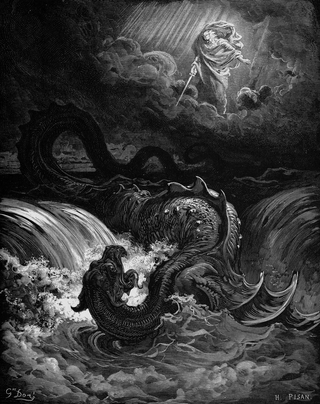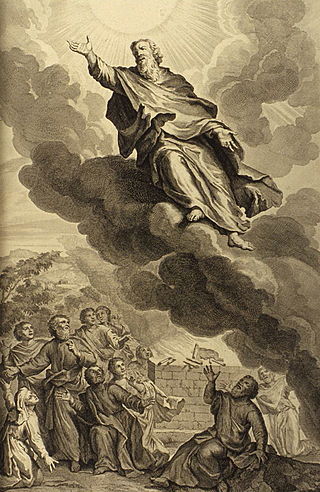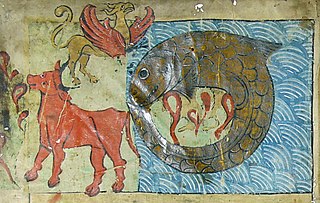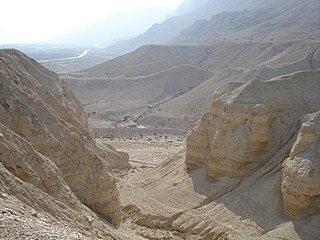
In Abrahamic religions, the Garden of Eden or Garden of God, also called the Terrestrial Paradise, is the biblical paradise described in Genesis 2–3 and Ezekiel 28 and 31.

Leviathan is a sea serpent noted in theology and mythology. It is referenced in several books of the Hebrew Bible, including Psalms, the Book of Job, the Book of Isaiah, the Book of Amos, and, according to some translations, in the Book of Jonah; it is also mentioned in the Book of Enoch. The Leviathan is often an embodiment of chaos and threatening to eat the damned after their life. In the end, it is annihilated. Christian theologians identified Leviathan with the demon of the deadly sin envy. According to Ophite diagrams, the Leviathan encapsulates the space of the material world.

Enoch is a biblical figure and patriarch prior to Noah's flood, and the son of Jared and father of Methuselah. He was of the Antediluvian period in the Hebrew Bible.

Metatron, or Mattatron, is an angel in Judaism, Christianity, and Islam mentioned three times in the Talmud, in a few brief passages in the Aggadah, and in mystical Kabbalistic texts within Rabbinic literature. The figure forms one of the traces for the presence of dualist proclivities in the otherwise monotheistic visions of both the Tanakh and later Christian doctrine. In the Jewish kabbalistic tradition, he is sometimes portrayed as serving as the celestial scribe. The name Metatron is not mentioned in the Torah or the Bible and how the name originated is a matter of debate. In Islamic tradition, he is also known as Mīṭaṭrūn, the angel of the veil.

The Land of Nod is a place mentioned in the Book of Genesis of the Hebrew Bible, located "on the east of Eden" (qiḏmaṯ-ʿḖḏen), where Cain was exiled by God after Cain had murdered his brother Abel. According to Genesis 4:16:
And Cain went out from the presence of the LORD, and dwelt in the land of Nod, on the east of Eden.
וַיֵּ֥צֵא קַ֖יִן מִלִּפְנֵ֣י יְהוָ֑ה וַיֵּ֥שֶׁב בְּאֶֽרֶץ־נֹ֖וד קִדְמַת־עֵֽדֶן׃

The Book of Enoch is an ancient Hebrew apocalyptic religious text, ascribed by tradition to the patriarch Enoch who was the great-grandfather of Noah. The Book of Enoch contains unique material on the origins of demons and Nephilim, why some angels fell from heaven, an explanation of why the Genesis flood was morally necessary, and a prophetic exposition of the thousand-year reign of the Messiah. Three books are traditionally attributed to Enoch, including the distinct works 2 Enoch and 3 Enoch. None of the three books are considered to be canonical scripture by the majority of Jewish or Christian church bodies.

Forbidden fruit is a name given to the fruit growing in the Garden of Eden which God commands mankind not to eat. In the biblical story, Adam and Eve eat the fruit from the tree of the knowledge of good and evil and are exiled from Eden.
And the Lord God commanded the man, saying, Of every tree of the garden thou mayest freely eat: But of the tree of the knowledge of good and evil, thou shalt not eat of it: for in the day that thou eatest thereof thou shalt surely die.

In the Book of Ezekiel in the Hebrew Bible, New Jerusalem is Ezekiel's prophetic vision of a city centered on the rebuilt Holy Temple, the Third Temple, to be established in Jerusalem, which would be the capital of the Messianic Kingdom, the meeting place of the twelve tribes of Israel, during the Messianic era. The prophecy is recorded by Ezekiel as having been received on Yom Kippur of the year 3372 of the Hebrew calendar.
The Book of Moses, dictated by Joseph Smith, is part of the scriptural canon for some denominations in the Latter Day Saint movement. The book begins with the "Visions of Moses", a prologue to the story of the creation and the fall of man, and continues with material corresponding to the Joseph Smith Translation of the Bible's (JST) first six chapters of the Book of Genesis, interrupted by two chapters of "extracts from the prophecy of Enoch".

A Watcher is a type of biblical angel. The word occurs in both plural and singular forms in the Book of Daniel, where reference is made to the holiness of the beings. The apocryphal Books of Enoch refer to both good and bad Watchers, with a primary focus on the rebellious ones.
Shamsiel, also spelled Samsâpêêl, Shamshel, Shashiel or Shamshiel, was the 16th Watcher of the 20 leaders of the 200 fallen angels that are mentioned in the Book of Enoch. The name means "God is my sun", which is fitting since it has been said that Shamsiel taught men the signs of the sun during the days of Jared or Yered. Shamash may share some mythological basis with Shamsiel.
"Adam-ondi-Ahman" is an LDS hymn and was included in the first Latter Day Saint hymnal and quickly became one of the most popular songs of the early church. It was published in 1835 in Messenger and Advocate and is hymn number 49 in the current LDS Church hymnal.
The Second Book of Enoch is a pseudepigraphic text in the apocalyptic genre. It describes the ascent of the patriarch Enoch, ancestor of Noah, through ten heavens of an Earth-centered cosmos. The Slavonic edition and translation of 2 Enoch is of Christian origin in the 8th century but is based on an earlier work. 2 Enoch is distinct from the Book of Enoch, known as 1 Enoch, and there is also an unrelated 3 Enoch, although none of the three books are considered canonical scripture by the majority of Jewish or Christian bodies. The numbering of these texts has been applied by scholars to distinguish each from the others.

The concept of Seven Archangels is found in some works of early Jewish literature and in Christianity. In those texts, they are referenced as the angels who serve God directly.

Behemoth is a beast from the biblical Book of Job, and is a form of the primeval chaos-monster created by God at the beginning of creation; he is paired with the other chaos-monster, Leviathan, and according to later Jewish tradition both would become food for the righteous at the end-time. Metaphorically, the name has come to be used for any extremely large or powerful entity.
East of Eden may refer to:

The Aramaic Enoch Scroll is a non-published, complete copy of the Book of Enoch which is rumored to be in possession of private investors.

Sumerian Comics is an American comic book publisher based in Los Angeles, California. The company was founded in 2020 by Nathan Yocum and Ryan Swanson as Behemoth Comics. The comic division sells over half a million (500,000+) comics yearly, reached 8th in total market share in 2021, and is known for its licensed titles like American Psycho and working with companies like Ubisoft, Netflix, among others. Their titles are currently distributed globally by Simon & Schuster & Diamond Comic Distributors. As of 2022, the company is owned by Sumerian Records and was subsequently renamed as Sumerian Comics in July 2022.

The Garden of Eden Ice Plateau is a large ice field on the western side of New Zealand's Southern Alps / Kā Tiritiri o te Moana. At over 9 km (5.6 mi) long, the Garden of Eden is one of the largest ice fields in New Zealand, along with the equally-sized Garden of Allah Ice Field which sits just to the north. The ice field is one of many geographic features in the area between the main divide of the Southern Alps and the Adams Range which share biblical names, a convention first established by the earliest explorers to the area. The Garden's remote location and difficult conditions make research difficult, especially with restrictions on helicopter landings imposed through the designation of the area as Adams Wilderness Area in 2003. Despite this, the ice plateau has been a popular destination for tramping groups for over 80 years, with access routes from both coasts and easily reachable areas once on the plateau itself.
Zotiel is one of the several angels named in the apocryphal Book of Enoch. The name means "little one of God" in Hebrew. It is also listed as among the 'princes of paradise' in the poet Gustav Davidson's Dictionary of Angels.












